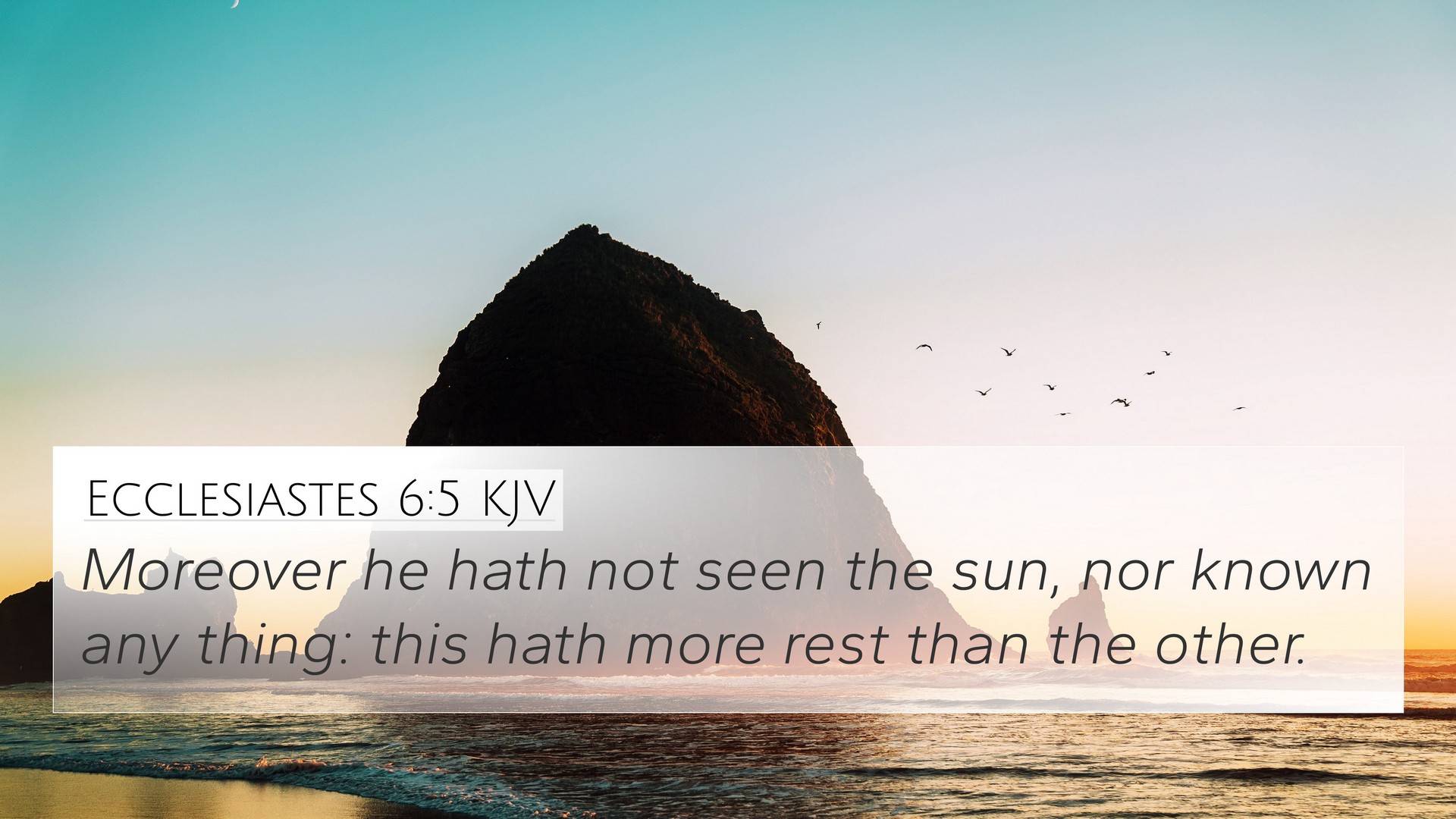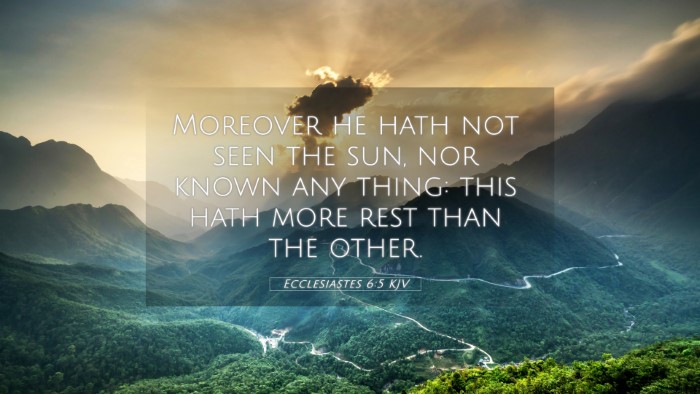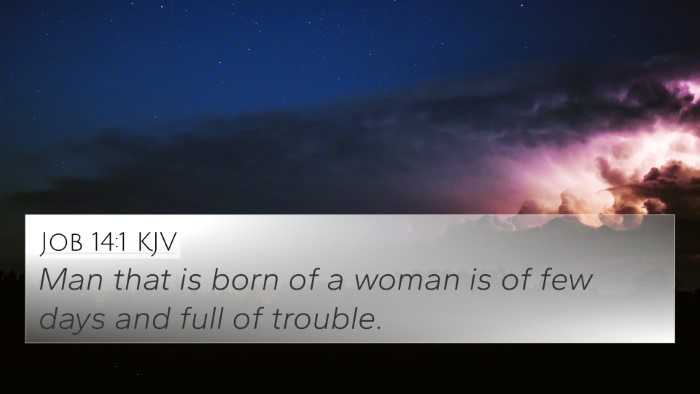Old Testament
Genesis Exodus Leviticus Numbers Deuteronomy Joshua Judges Ruth 1 Samuel 2 Samuel 1 Kings 2 Kings 1 Chronicles 2 Chronicles Ezra Nehemiah Esther Job Psalms Proverbs Ecclesiastes Song of Solomon Isaiah Jeremiah Lamentations Ezekiel Daniel Hosea Joel Amos Obadiah Jonah Micah Nahum Habakkuk Zephaniah Haggai Zechariah MalachiEcclesiastes 6:5 Similar Verses
Ecclesiastes 6:5 Cross References
Moreover he hath not seen the sun, nor known any thing: this hath more rest than the other.
Uncover the Rich Themes and Topics of This Bible Verse
Listed below are the Bible themes associated with Ecclesiastes 6:5. We invite you to explore each theme to gain deeper insights into the Scriptures.
Ecclesiastes 6:5 Cross Reference Verses
This section features a detailed cross-reference designed to enrich your understanding of the Scriptures. Below, you will find carefully selected verses that echo the themes and teachings related to Ecclesiastes 6:5 KJV. Click on any image to explore detailed analyses of related Bible verses and uncover deeper theological insights.
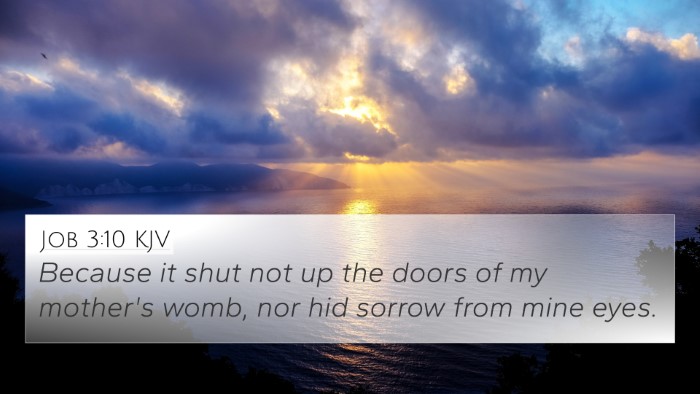
Job 3:10 (KJV) »
Because it shut not up the doors of my mother's womb, nor hid sorrow from mine eyes.
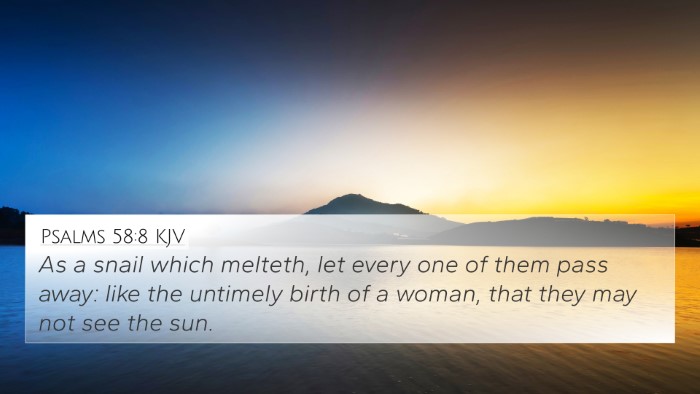
Psalms 58:8 (KJV) »
As a snail which melteth, let every one of them pass away: like the untimely birth of a woman, that they may not see the sun.
Ecclesiastes 6:5 Verse Analysis and Similar Verses
Understanding Ecclesiastes 6:5
Ecclesiastes 6:5 states: "Moreover they have not seen the sun, nor known anything: this hath more rest than the other." This verse presents a profound observation about the fate of those who have not experienced life and the inherent rest they might possess compared to those who have.
The verse can be understood through various angles by drawing from the commentaries of Matthew Henry, Albert Barnes, and Adam Clarke, combined with cross-references from the Bible, providing a comprehensive insight into its meaning.
Verse Analysis
In this verse, the Preacher in Ecclesiastes reflects on the condition of those who have not lived long enough to "see the sun" or truly experience life. The "rest" mentioned could be interpreted as a state devoid of the struggles and sorrows that accompany existence.
Commentary Insights
-
Matthew Henry:
Henry discusses the idea that those who have never lived can be considered better off than the living, as they escape the burdens and vanity of life. He emphasizes the futility experienced by humans in their pursuits since life is inherently filled with sorrow.
-
Albert Barnes:
Barnes points to the notion that the sufferings of this life often outweigh its pleasures. He posits that a stillborn child, which never encounters life's hardships, achieves a certain peace that is often sought after by the living.
-
Adam Clarke:
Clarke adds a theological perspective by relating human existence to divine purposes. He reflects on the sorrow that accompanies life and suggests that the peace of non-existence can be a mercy in certain contexts.
Cross-References to Ecclesiastes 6:5
- Job 3:11-12: Job curses the day of his birth, expressing a desire for a state of non-existence similar to the sentiment of Ecclesiastes 6:5.
- Psalm 90:10: "The days of our years are threescore years and ten; and if by reason of strength they be fourscore years, yet is their strength labor and sorrow;" - Reflects on the shortness and struggles of life.
- Ecclesiastes 4:2: "Wherefore I praised the dead which are already dead more than the living which are yet alive;" - Echoes the theme that the dead may be in a better state than the living.
- Romans 9:11: Discusses God’s sovereignty and the purpose of existence; tying into questions about the meaning of life.
- Luke 12:20: Relates to the spirit being taken away, illustrating the transient nature of life and the afterlife being considered better.
- Philippians 1:21-23: Paul expresses a desire to depart and be with Christ, reflecting the better state after earthly life.
- Revelation 14:13: "Blessed are the dead which die in the Lord from henceforth:" - Acknowledging the peace found in death for the faithful.
Thematic Connections
Ecclesiastes 6:5 can be tied to larger biblical themes including the nature of existence, the struggles of life, and the pursuit of peace. It raises questions about what it means to truly live, as well as the existential struggles faced by humanity. This verse invites the reader to consider life’s meaning and the comforts of death, as illustrated in various other biblical texts, creating a rich tapestry of thematic connections.
Connecting Bible Verses
By engaging in a comparative Bible verse analysis with verses mentioned earlier, one can uncover deep insights about life and death from a biblical standpoint. Notably, the cross-references highlight the consistent biblical theme of seeking peace amid turmoil and the question of existence's value.
Tools for Bible Cross-Referencing
For those looking to dive deeper into themes such as this, tools like a Bible concordance or a Bible cross-reference guide can be beneficial. These resources facilitate the cross-referencing of Biblical texts, allowing users to find connections between Bible verses effectively and efficiently.
Conclusion
Ecclesiastes 6:5 prompts a reflection on the conditions of life and death, encouraging a pursuit of understanding through scriptural cross-referencing. The insights garnered from biblical commentaries shed light on its significance and versatility in theological discussions. Thus, those seeking a deeper understanding can utilize cross-referencing methods and resources to explore the complexities of this verse and its connections to the wider narratives of scripture.
